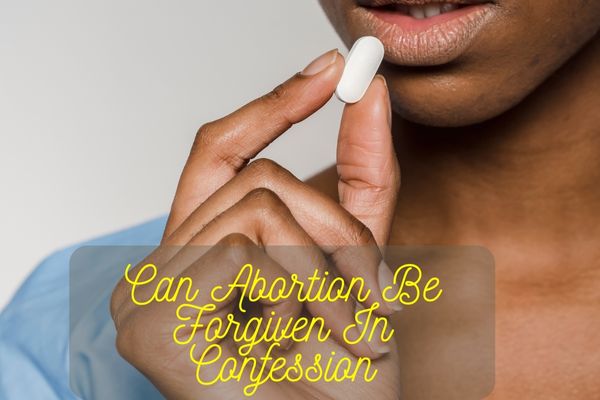The question of whether abortion can be forgiven in confession is a very complicated and sensitive one that has inspired much debate and discussion in theological and ethical circles.
Abortion, the intentional termination of a pregnancy, carries significant moral weight and can lead to individuals seeking forgiveness and spiritual solace through the sacrament of confession in several religious traditions. This conversation looks into the theological, ethical, and emotional sides of this dilemma, examining different religious faiths’ perspectives and teachings on forgiveness and redemption in the context of abortion.
Can Abortion Be Forgiven In Confession
Abortion can be forgiven in many religious traditions, including Catholicism, through the sacrament of confession or reconciliation. Confession is a sacred and intensely personal activity in which people confess their sins to a priest or spiritual counselor to receive forgiveness and reconciliation from God.
Abortion is considered a severe sin in the Catholic Church since it entails the purposeful termination of a pregnancy. The Church, on the other hand, teaches that God’s compassion and mercy are unlimited and that forgiveness is attainable to those who repent and seek reconciliation.
When someone confesses the sin of abortion, they are encouraged to display genuine remorse, recognize the gravity of their actions, and declare a genuine desire to change their ways. As a representative of God’s mercy, the priest offers absolution and direction, as well as spiritual support and counsel to assist the individual in healing and moving ahead. It’s vital to remember that forgiveness and healing are deeply personal journeys, and everyone’s experience will be different. While the sacrament of confession is important for many people, they can also find peace and forgiveness via personal prayer, reflection, and seeking assistance from their faith community.
Religious Perspectives On Abortion
Religious beliefs and teachings offer diverse perspectives on abortion. Different faith traditions have varying interpretations and attitudes towards the moral and ethical implications of terminating a pregnancy. It is essential to explore these perspectives to understand the role of forgiveness in the context of abortion within each religion.
- Christianity
In Christianity, views on abortion vary among denominations. Some consider abortion to be morally wrong, while others allow for certain exceptions. The concept of forgiveness plays a significant role in Christianity, emphasizing the importance of repentance, confession, and seeking redemption for past actions.
- Islam
In Islam, abortion is generally prohibited except in specific circumstances, such as when the life or health of the mother is at risk. Islamic teachings emphasize the importance of seeking forgiveness from Allah and the need for sincere repentance.
- Judaism
Jewish perspectives on abortion recognize the sanctity of life but also acknowledge circumstances where abortion may be permissible, such as when the life or health of the mother is in danger. Seeking forgiveness in Judaism involves teshuvah, a process of repentance and making amends.
- Hinduism
Hindu beliefs on abortion are diverse, with some considering it morally wrong and others allowing for certain exceptions. Seeking forgiveness in Hinduism involves acknowledging one’s actions, seeking guidance from spiritual leaders, and performing rituals and penances.
- Buddhism
Buddhist teachings generally emphasize non-violence and compassion. Views on abortion within Buddhism vary, but it is generally discouraged. Seeking forgiveness in Buddhism involves recognizing one’s actions, cultivating mindfulness, and making efforts to live a morally upright life.
The Way of Reconciliation
Seeking forgiveness for abortion in confession usually entails a period of introspection and repentance.
The individual should:
- Recognize the gravity of the transgression and express genuine regret for their acts.
- Seek confession from a priest and openly report the abortion.
- Attend confession, where they confess their sin, express their remorse, and obtain absolution.
- Commit to abstaining from abortion in the future and make atonement for their actions through penance.
- Live a life guided by their religion and the teachings of the Church on the sanctity of life.
The Role Of Confession And Forgiveness
Confession and seeking forgiveness are integral parts of religious practices in many traditions. They provide a framework for individuals to acknowledge their mistakes, express remorse, and seek reconciliation with a higher power and the community.
- Christianity
In Christianity, confession and repentance are crucial for seeking forgiveness. The sacrament of confession allows individuals to confess their sins to a priest, who acts as a spiritual guide and offers absolution on behalf of God. Through confession, individuals can seek forgiveness for their involvement in abortion.
- Islam
In Islam, seeking forgiveness involves sincere repentance, offering prayers, performing good deeds, and seeking Allah’s mercy. While there is no formal confession practice in Islam, individuals are encouraged to turn to Allah, seek forgiveness, and strive to lead a righteous life.
- Judaism
In Judaism, seeking forgiveness involves a process of teshuvah, which includes acknowledging one’s mistakes, expressing remorse, making amends, and striving to change. Confession is typically done privately to God and can be accompanied by seeking forgiveness from those directly affected by one’s actions.
- Hinduism
In Hinduism, seeking forgiveness involves acknowledging one’s actions, expressing remorse, and performing rituals and penances. Confession can be done privately or in the presence of spiritual leaders, who offer guidance and support on the path to forgiveness and spiritual growth.
- Buddhism
In Buddhism, seeking forgiveness involves recognizing one’s actions, cultivating mindfulness, and making efforts to live a morally upright life. Confession is not a formal practice in Buddhism, but individuals are encouraged to reflect on their actions, develop insight, and strive to overcome negative behaviors.
Conclusion
Abortion is a deeply personal and complex decision that can evoke a range of emotions and moral considerations. Forgiveness in the context of abortion is multifaceted and varies across different religious traditions. Confession and seeking forgiveness play significant roles in many religions, offering individuals a path toward redemption and healing.
While seeking forgiveness for involvement in abortion is possible within religious frameworks, the process of forgiveness is deeply personal and may involve self-forgiveness, seeking support from others, and engaging in personal growth and healing.






